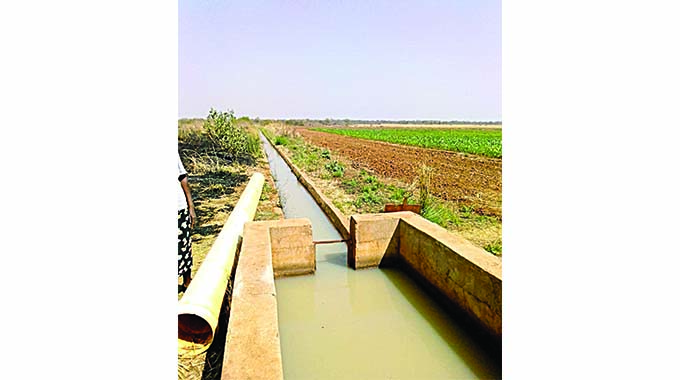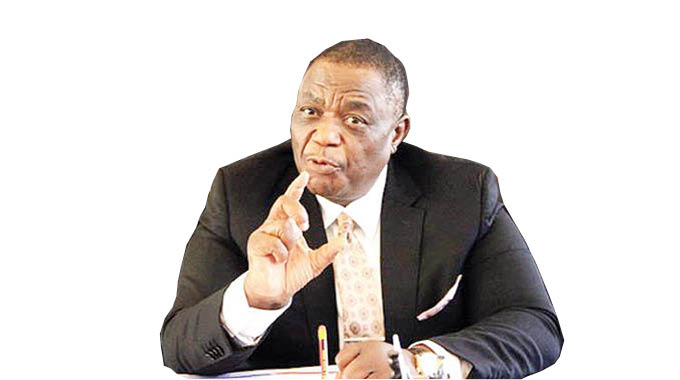Leaky canal retards ‘game changer’ irrigation project

Leonard Ncube, Victoria Falls Reporter
POLLARDS Irrigation Scheme in Bubi District, Matabeleland North is a low hanging fruit that can transform the area into a greenbelt and improve local people’s livelihoods if fully utilised.
The 45-hectare irrigation scheme became fully operational in 2015 but only two thirds of the land has been utilised over the years because of water challenges.
The scheme draws its water from Pollards Dam, which was built by Government in 2000 and has a capacity of 3,2 million cubic metres of water.
The irrigation scheme is located near Inyathi Business Centre and has 101 members, a majority of them from Ward 11 while one member comes from ward 22 after he relocated to a neighbouring community but maintained membership.
Pollards Dam was full to capacity after the good rains received in the country during the last rainy season, according to Zimbabwe National Water Authority (Zinwa) which manages the water body.
The scheme uses a canal to draw water from the dam about 7km away, but it is reportedly leaking because of cracks that developed soon after construction.

Some of the Pollards Irrigation Scheme members
This has been the irrigation scheme’s major setback as the 101 members struggle to pump enough water with a lot of it lost along the way.
Currently there are seven hectares of maize planted in July and another four hectares planted early this month as well as cabbages and red chilli, sugar beans and onions.
In 2017 the irrigation scheme produced 36 tonnes of wheat after planting 10ha under Command Agriculture.
A section of the land was this year put on Intwasa farming programme and the scheme delivered two tonnes of maize to GMB.
Bubi is a semi-arid rural area with mining and farming as its major economic activity and with support to the irrigation scheme the area can be transformed into a greenbelt and exporter of farm produce to other districts.
However, of concern is the fact that a majority of the 101 members are elderly people as youth prefer to venture into mining.
The scheme’s chairman Mr Thembinkosi Mabhena said there is huge potential to be a game changer for Bubi District.
“The dam was constructed in 2000 for irrigation and consumption and the scheme became fully operational in 2015.
It hasn’t really given us its full potential because we don’t get 100 percent water supply as a result of the leaking canal. We have tried to fix it but with no success,” said Mr Mabhena.
He said the scheme was idle for a better part of last year because of challenges with the leaking canal.
Its gradient also reportedly makes it difficult for smooth water flow.
“The irrigation has potential to be a green belt. People come from as far as Bulawayo to buy green mealies for resale and this year we delivered 100 bags of maize to the Grain Marketing Board after each member contributed a bag, with only one exception because the family was bereaved,” said Mr Mabhena.
He said the scheme also requires a combine harvester as reliance on hired equipment is not sustainable.
The scheme is also a source of employment for locals as members usually employ people to help prepare the land.
Members contribute to buy inputs at the start of each planting season.
Mr Mabhena said the irrigation scheme needs an alternative water source and appealed for assistance.
“We have received inputs from Government before but on specific schemes like Intwasa and Command Agriculture.
We appeal to Government or anyone who is willing to assist us to drill at least four boreholes and build a reservoir.
Our wish is to replace the canal system with piping so that we use centre pivots. People are working hard but water challenges compromise production,” said Mr Mabhena.
The members have started building an office on site.
One of the scheme members Mrs Alice Kanyono said she has been able to provide for her family and buy livestock using income from the project.
Bubi legislator Cde Sonny Mguni said efforts are being made at Government level to address the situation.
“The challenge is water supply as the canal is leaking and it looks like the contractor did not do a perfect job because even its gradient is not up to standard as water accumulates along the way. The irrigation has potential to do well and transform the whole community but it’s operating below capacity.
We have reported the issue to the Ministry of Lands, Agriculture, Water and Rural Resettlement so we are waiting for action. Our wish is that the canals can be replaced with centre pivots so the scheme can use overhead irrigation,” said Cde Mguni.
Government is on a drive to put 200ha under irrigation in each of the country’s districts as one of the strategies under the National Development Strategy 1 (NDS1), the country’s economic blueprint aimed at achieving economic transformation.—@ncubeleon












Comments